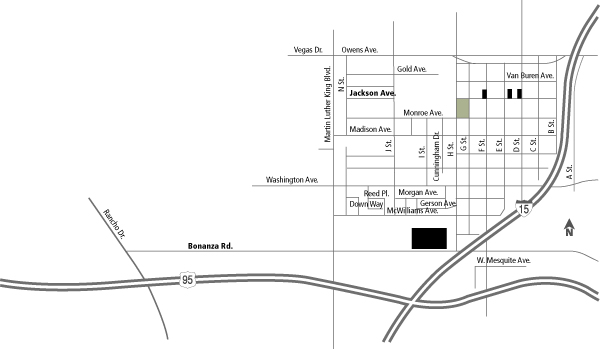RUNNING OUT OF TIME
Dedra Edmond's grandparents opened Johnson's Malt Shop on Jackson Avenue in the early 1940s, a time when the street was blooming into the "Black Strip," a thriving West Las Vegas nightclub district.
They built a house there, too, one that just about every member of the family has lived in at one point or another. And there are a few small hotel rooms, a reminder of a time when black visitors had trouble finding a place to stay outside of West Las Vegas, the city's historic black neighborhood generally bordered by Carey Avenue on the north, Bonanza Road on the south, Interstate 15 on the east and Rancho Drive on the west.
The years have not been kind to the property, nor to that stretch of Jackson Avenue. Today it's mostly vacant lots and empty storefronts, and Edmond's buildings are boarded up and vacant, one damaged by a fire that shares a bizarre connection to a 2006 shootout between a rapper and police.
There are plans calling for redevelopment in the area, and some investments are showing up. Edmond says she wants time to rehab the buildings that are so entwined in her family history, but she probably won't get it.
On Wednesday, the Las Vegas City Council ordered that the buildings be demolished, saying they're not salvageable.
"My granddaddy built this," she said Friday, looking at the "No Trespassing" warning spray-painted across the front of her grandparents' old house. "Nobody wants it like this. This is not a representation of what my granddaddy worked for."
There's little left on Jackson Avenue to show what a flourishing district it used to be. All that remains from the heady post-war period is the New Town Tavern casino at Jackson and F Street, and its only neighbors are a church office, a barber shop and a motorcycle repair garage.
Edmond's grandparents closed the malt shop in the early 1980s because of her grandfather's health.
There were a couple of unsuccessful stabs at renting it, but for the most part the building, like the neighborhood around it, fell into disuse.
Then, in 2006, the property got some unwanted attention.
In February of that year, local rapper Amir Crump opened fire on officers responding to a domestic disturbance at his southwest valley house, killing one, Las Vegas police Sgt. Henry Prendes, before being shot to death.
His group, Desert Mobb, had released a CD a few months before and had posed in front of Edmond's property for the cover photograph, which was broadcast widely after the shooting.
On Feb. 7, 2006, the morning of the officer's funeral, the house on Edmond's property caught fire.
It was quickly extinguished, but the timing made Edmond think that someone vandalized her property to get back at Crump.
Some people dismissed it as a coincidence, but "I just can't accept it," she said. "I believe they were trying to target him, not knowing I had no association with this guy."
She spent much of the next two years wanting someone to be held accountable for the fire, energy she now says could've been better spent pushing her project.
"You can't do this on emotion," she said. "My fight then was trying to find out who did this ... and let them know that they did it to the wrong person."
Edmond estimated it would take $200,000 to get the old restaurant and the house ready for business. A fried fish restaurant wants the old malt shop building, she said, and she and her brother want to open a print shop in the house.
"I want to do this for my family, for my grandmother," she said. "I just haven't had the resources."
From the city's perspective, however, it's not about the resources. It's about public safety.
"No matter if it was you or I or Donald Trump, you would have to tear that structure down and start from the ground up," said Ward 5 Councilman Ricki Barlow, who represents the area.
"We sent in certified city building inspectors. They would not issue a certificate of occupancy."
He said the buildings are a "blight" and that squatters and drug users break in both for drug use and to hide from the police. Barlow also said, though, that he's supportive of Edmond opening a business there, just not in those buildings.
"This property ... has been a problem for a very long time," Barlow said at the council meeting. "Something has to be done in order to turn this community around. I believe that we need some new development at that location."
Devin Smith, who manages the city's Neighborhood Response Division, agreed. His division spends a lot of time inspecting, cleaning up and securing vacant and abandoned properties.
"Financially, we don't think it's feasible to rehab these buildings," he told the council.
Edmond can seek a court injunction to stall the demolition while she tries to prove otherwise, but time is limited. She said she was expecting a 10-day demolition notice from the city soon.
In fact, during a tour of the property Friday, a city contractor showed up, saying he was estimating how much it would cost to check the property for asbestos before tearing it down.
Contact reporter Alan Choate at achoate @reviewjournal.com or (702) 229-6435.





















